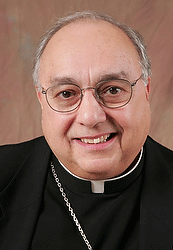CHERRY HILL, N.J. (CNS) — Bishop Joseph A. Galante challenged leaders of Catholic pro-life, family life and social justice offices around the country to “tear down our cubicles” and “give up our turf” in order to model collaboration for the rest of the Church.
The bishop of Camden, N.J., spoke July 25 at the close of the first day of a national conference in his diocese called “Life, Justice & Family: Partners in the New Evangelization.”
Bishop Galante said those in the Church are sometimes guilty of “paralysis by analysis,” with each person examining only his or her own area of expertise and then “wondering why we’re not having a greater impact on those whom we serve.”
“In a culture of individualism it is most important that we live and model communally what we teach,” he added. “By giving up the prerogatives of turf, we can discover a more ecclesial way of ministering.”
[hotblock]
Bishop Galante said the Trinity, with its “divine unity and divine diversity,” offers the “key to how we live and are Church.”
Reminding his audience that the body of Christ includes everyone, from the moment of conception to the “the last breath breathed,” the hungry, the thirsty, the imprisoned and the homeless, the bishop asked, “How can we dishonor, dismember, destroy that body? How can we kill the unborn, bomb the Iraqis, shun the one who is different from us?
“How can we deny that the least of our sisters and brothers are Jesus and yet say that Jesus lives in us?” he added.
But Bishop Galante said Catholics can look for guidance to Church teachings contained in the Gospels, the documents of the Second Vatican Council, and the “sound and profound encyclicals” and other writings of Popes Paul VI, John Paul II and Benedict XVI.
“Our world of sound bites and catchy headlines do not do justice to these documents,” he said.
Speaking on the 40th anniversary of Pope Paul’s encyclical “Humanae Vitae” (“Of Human Life”), Bishop Galante said many “failed to appreciate the depth of its teachings on marriage.”
He called on participants in the conference to “read, discuss, explain, understand and live these writings.”
“But that is not enough,” he added. “It is most important for us to pray over what we’ve read and for us to strive to live what we have read.”
Bishop Galante said Jesus “had a reason for sending out his followers two by two — to teach community.”
In the work of the Church, he said, “there is no room for competitiveness, no room for going it alone.”
Earlier in the day, Helen Alvare, an associate professor at George Mason University School of Law in Fairfax, Va., spoke about the tools offered by American secular culture and law to help people achieve “life, dignity, freedom, equality and progress” and compared them to the tools offered by Catholic teachings.
Some of the tools offered by secular culture are “problematic or worse from a Catholic perspective,” she said.
The value put on freedom as autonomy and individualism, for example, has led to family law policies in the U.S. that leaves only 10 to 20 percent of women with spousal support, usually lasting only one or two years, she said.
The courts also have declared people “free from the dictates of our own physical makeup,” Alvare said.
“In an attempt to promote equality,” the courts have said, “If we acknowledge sex differences then women will be oppressed,” she added.
But Church teaching, in “direct contradiction” to the view that autonomy is the ultimate value, proclaims the value of solidarity and the view that “the body does not mean nothing,” she said.
The secular value of materialism and consumerism also have led courts to declare that “money is equivalent to the good life” and that “money is all you need to have the same outcomes” for children in single-parent homes as they would receive in a family with two loving parents, she said.
In contrast Church teaching sees the family “as the primary school of love” and its members as “stewards of the world, not rapacious consumers,” Alvare said.
Just back from attending World Youth Day in Sydney, Australia, with her 12-year-old son, Alvare said she found hope in “the persistent presence of religious voices” and in the fact that “there is always a taste for truth out there.”
“By promoting the dignity of the human person” and fighting for legislation on health care, immigration, poverty and a wide range of other issues, she said, Catholics are “holding up a flame of truth that does not get extinguished.”
PREVIOUS: Adult stem cells making news in courts, Congress and on football field
NEXT: 18 Catholic colleges appeal parts of federal health care law mandate




Share this story